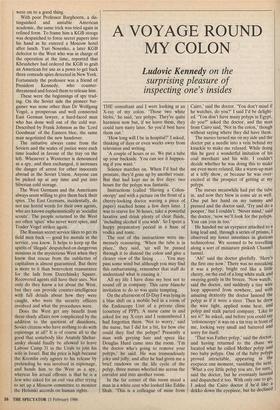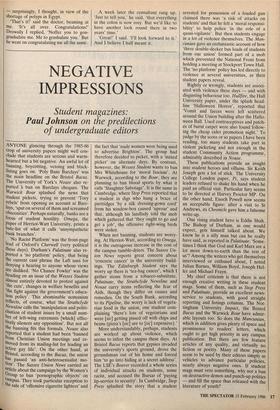A VOYAGE ROUND MY COLON
Ludovic Kennedy on the
surprising pleasure of inspecting one's insides
THE consultant and I were looking at an X-ray of my colon. 'Those two white blobs,' he said, 'are polyps. They're quite harmless now but, if we leave them, they could turn nasty later. So you'd best have them out.'
'How long will I be in hospital?' I asked, thinking of days or even weeks away from television and writing.
'A couple of hours or so. We put a tube up your backside. You can see it happen- ing if you want.'
Science marches on. When I'd had the prostate, they'd gone up by another route. But that had kept me in five days: two hours for the polyps was fantastic.
Instructions (called 'Having a Colon- oscopy' and with a picture on the front of a cheery-looking doctor waving a piece of paper) reached home a few days later. I was to starve for 36 hours, take a powerful laxative and drink plenty of clear fluids, 'including alcohol if you wish'. So I spent a happy preparatory period in a haze of vodka and tonic.
The rest of the instructions were im- mensely reassuring. 'When the tube is in place,' they said, 'air will be passed through it to distend the colon and give a clearer view of the lining . . . . You may pass some wind but although you may find this embarrassing, remember that staff do understand what is causing it.'
All my life I have done my best not to sound off in company. This carte blanche invitation to do so was quite tempting.
On the afternoon of D-Day I was lying in a blue shift on a mobile bed in a room of the Endoscopy Unit of a private clinic (courtesy of PPP). A nurse came in and asked for my X-rays and I remembered I had forgotten them. 'Not to worry,' said the nurse, but I did for a bit, for how else could they find the polyps? Presently a man with greying hair and specs like Douglas Hurd came into the room. 'I'm the doctor who's going to remove your polyps,' he said. He was tremendously joky and jolly, and after he had given me a brief rundown on the life cycle of the polyp, three nurses wheeled me across the corridor and into another room.
In the far corner of this room stood a man in a white coat who looked like Eddie Shah. 'This is a colleague of mine from Cairo,' said the doctor. 'You don't mind if he watches, do you?' I said I'd be delight- ed. 'You don't have many polyps in Egypt, do you?' asked the doctor, and the man from Cairo said, 'Not in the colon,' though without saying where they did have them.
The nurses turned me on my side and the doctor put a needle into a vein behind my knuckle to make me relaxed. While doing this he gave a wonderful imitation of his coal merchant and his wife. I couldn't decide whether he was doing this to make me even more relaxed, like a warm-up man at a telly show, or because he was over- excited at the prospect of getting at my polyps.
The nurses meanwhile had put the tube in, and now they blew in some air as well. One put her hand on my tummy and pressed and the doctor said, 'Try and do a pooper,' but I couldn't. 'Never mind,' said the doctor, 'now we'll look for the polyps. You can join in too.'
He handed me an eyepiece attached to a long lead and, through a series of prisms, I observed my lower intestines in glorious technicolour. We seemed to be travelling along a sort of miniature pinkish Channel tunnel.
`Ah!' said the doctor gleefully. 'Here's the first one now.' There was no mistaking it was a polyp; bright red like a little cherry, on the end of a long white stalk and swaying gently in the breeze. 'Now watch,' said the doctor, and suddenly a tiny wire loop appeared from nowhere, and with amazing dexterity the doctor lassoed the polyp as if it were a steer. Then he drew the wire tight, applied some heat, and polyp and stalk parted company. 'Like to see it?' he asked, and before you could say `colonoscopy' it was on a tin tray in front of me, looking very small and battered and sorry for itself. 'That was Father polyp,' said the doctor, and having returned to the chase we located what he called Mother polyp and two baby polyps. One of the baby polyps proved intractable, appearing in the eyepiece one moment, vanishing the next; 'What a coy little polyp you are, for sure, said the doctor, but he eventualy lassoed and dispatched it too. With only one to go, I asked the Cairo doctor if he'd like a dekko down the eyepiece, but he declined — surprisingly, I thought, in view of the shortage of polyps in Egypt.
'That's it!' said the doctor, beaming at me. 'It's all over. Congratulations!' Drowsily I replied, Noffer you to gon- grashulate me. Me to grashulate you.' But he went on congratulating me all the same. A week later the consultant rang up. 'Just to tell you,' he said, 'that everything in the colon is now rosy. But we'd like to have another look round there in two years' time.'
'Great!' I said. 'I'll look forward to it.' And I believe I half meant it.






































 Previous page
Previous page